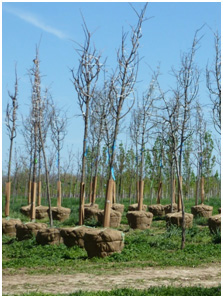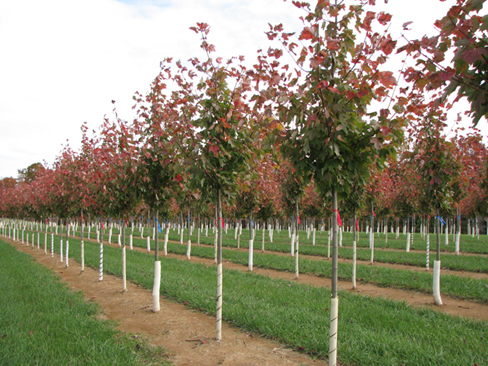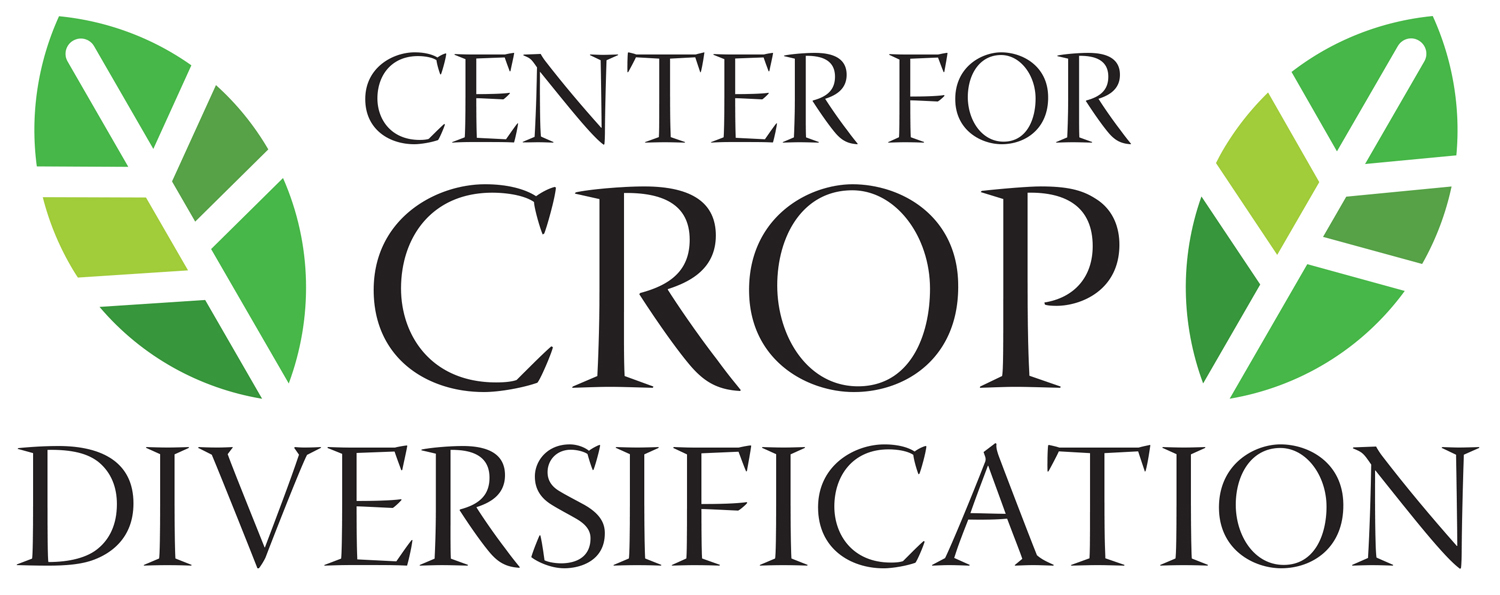Field Nursery Production
Field nurseries are the traditional method of producing and marketing ornamental trees, shrubs, fruit trees, and perennial flowers. Until the mid-1900s, nearly all nursery crops were produced in the field. Even with the advent of above-ground container and pot-in-pot production, field nurseries are still widely used. Some of the advantages of field production over other production methods include: less maintenance and labor requirements during the growing period, ability of plants to overwinter in the field without additional protective measures, and lower start-up costs. In Kentucky, most field-grown trees and shrubs are sold as balled-and-burlapped (B&B), meaning that the soil surrounding the plant’s root system is dug with the plant and wrapped in burlap.
Marketing
 Nursery crops are marketed in several different ways: Retailers market directly to the end consumer, typically homeowners. This is most commonly done either through retail nurseries, which produce some or all of their own plant material, or garden centers, which purchase their inventory from a wholesale nursery. These businesses must be conveniently located for consumer access, ideally near urban or high-traffic areas. Retail nurseries additionally require adequate space and facilities for production, either on-site or at a nearby location. Mail-order nurseries also sell directly to the end consumer, but their plants are shipped directly to the customer rather than sold at a retail outlet. This is a great option for nurseries that produce specialty plants and whose customers are plant enthusiasts located across the country or globe. The vast majority of mail-order nurseries sell either bare root or small container-grown plants (1-gallon containers or smaller) due to high shipping costs and difficulties in packaging, but larger plants can also be sold by mail-order nurseries if they are highly valuable. Wholesalers produce plants that are typically sold in large batches at significantly lower prices to landscapers, retailers, or other nurseries that grow and resell the material at a larger size. Wholesale production is most efficient and profitable when a limited number of plants are grown in large numbers. Re-wholesalers purchase large orders of various plants from wholesale producers and resell the plants to landscapers requiring diverse but smaller orders. Landscape nurseries usually produce plants for their own in-house landscaping service, but some may also sell plants at a retail outlet.
Nursery crops are marketed in several different ways: Retailers market directly to the end consumer, typically homeowners. This is most commonly done either through retail nurseries, which produce some or all of their own plant material, or garden centers, which purchase their inventory from a wholesale nursery. These businesses must be conveniently located for consumer access, ideally near urban or high-traffic areas. Retail nurseries additionally require adequate space and facilities for production, either on-site or at a nearby location. Mail-order nurseries also sell directly to the end consumer, but their plants are shipped directly to the customer rather than sold at a retail outlet. This is a great option for nurseries that produce specialty plants and whose customers are plant enthusiasts located across the country or globe. The vast majority of mail-order nurseries sell either bare root or small container-grown plants (1-gallon containers or smaller) due to high shipping costs and difficulties in packaging, but larger plants can also be sold by mail-order nurseries if they are highly valuable. Wholesalers produce plants that are typically sold in large batches at significantly lower prices to landscapers, retailers, or other nurseries that grow and resell the material at a larger size. Wholesale production is most efficient and profitable when a limited number of plants are grown in large numbers. Re-wholesalers purchase large orders of various plants from wholesale producers and resell the plants to landscapers requiring diverse but smaller orders. Landscape nurseries usually produce plants for their own in-house landscaping service, but some may also sell plants at a retail outlet.
Production
 The primary consideration in selecting a site for field nursery production is the soil. Fields should be free of large stones and hard pans that interfere with root development. Not only must the soil be fertile and well-drained, but it must hold together around the roots when plants are dug as B&B products. Production of bare-root plants requires a soil that will easily fall away from the roots. Bare-root production of trees and shrubs is not common in Kentucky. Locations that flood periodically must be avoided. The ideal site has a slightly sloping topography (less than 5 percent) and offers water drainage to a pond or retention basin for recycling back to the crop. A reliable source of clean, pest-free water is an important consideration if irrigation is to be used. Knowledge of the field history, including previous crops, herbicide use, and soil-borne disease incidence, is important in choosing the appropriate plants for the selected site.
The primary consideration in selecting a site for field nursery production is the soil. Fields should be free of large stones and hard pans that interfere with root development. Not only must the soil be fertile and well-drained, but it must hold together around the roots when plants are dug as B&B products. Production of bare-root plants requires a soil that will easily fall away from the roots. Bare-root production of trees and shrubs is not common in Kentucky. Locations that flood periodically must be avoided. The ideal site has a slightly sloping topography (less than 5 percent) and offers water drainage to a pond or retention basin for recycling back to the crop. A reliable source of clean, pest-free water is an important consideration if irrigation is to be used. Knowledge of the field history, including previous crops, herbicide use, and soil-borne disease incidence, is important in choosing the appropriate plants for the selected site.

